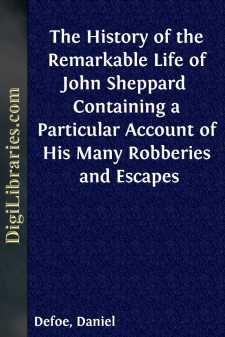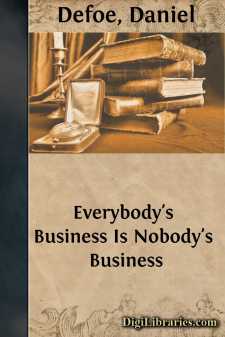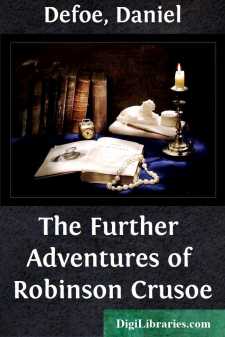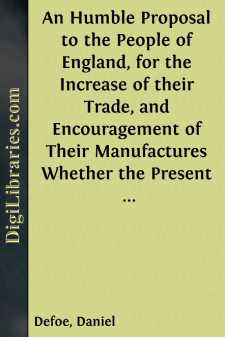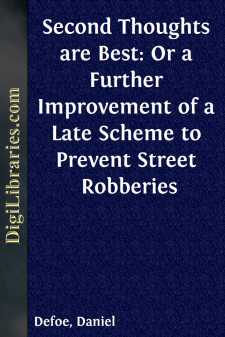Categories
- Antiques & Collectibles 13
- Architecture 36
- Art 48
- Bibles 22
- Biography & Autobiography 813
- Body, Mind & Spirit 142
- Business & Economics 28
- Children's Books 17
- Children's Fiction 14
- Computers 4
- Cooking 94
- Crafts & Hobbies 4
- Drama 346
- Education 46
- Family & Relationships 57
- Fiction 11829
- Games 19
- Gardening 17
- Health & Fitness 34
- History 1377
- House & Home 1
- Humor 147
- Juvenile Fiction 1873
- Juvenile Nonfiction 202
- Language Arts & Disciplines 88
- Law 16
- Literary Collections 686
- Literary Criticism 179
- Mathematics 13
- Medical 41
- Music 40
- Nature 179
- Non-Classifiable 1768
- Performing Arts 7
- Periodicals 1453
- Philosophy 64
- Photography 2
- Poetry 896
- Political Science 203
- Psychology 42
- Reference 154
- Religion 513
- Science 126
- Self-Help 84
- Social Science 81
- Sports & Recreation 34
- Study Aids 3
- Technology & Engineering 59
- Transportation 23
- Travel 463
- True Crime 29
Sort by:
by:
Daniel Defoe
The Consequences of this mistake, appear'd presently in the Most Zealous, in their offering all possible Insults to the Crolian Dissenters, Preaching them down, Printing them down, and Talking them down, as a People not fit to be suffer'd in the Nation, and now they thought they had the Game sure. Down with the Crolians began to be all the Cry, and truly the Crolians themselves began to be...
more...
by:
Daniel Defoe
THE LIFE OF Daniel De Foe was descended from a respectable family in the county of Northampton, and born in London, about the year 1663. His father, James Foe, was a butcher, in the parish of St. Giles's, Cripplegate, and a protestant dissenter. Why the subject of this memoir prefixed the De to his family name cannot now be ascertained, nor did he at any period of his life think it necessary to...
more...
by:
Daniel Defoe
INTRODUCTION. The father of Daniel Defoe was a butcher in the parish of St. Giles's, Cripplegate, London. In this parish, probably, Daniel Defoe was born in 1661, the year after the restoration of Charles II. The boy's parents wished him to become a dissenting minister, and so intrusted his education to a Mr. Morton who kept an academy for the training of nonconformist divines. How long Defoe...
more...
by:
Daniel Defoe
TO THE CITIZENSOF London and Westminster. GENTLEMEN, Experience has confirm'd you in that everlasting Maxim, that there is no other way to protect the Innocent, but by Punishing the Guilty. Crimes ever were, and ever must be unavoidably frequent in such populous Cities as yours are, being the necessary Consequences, either of the Wants, or the Depravity, of the lowest part of the humane Species....
more...
by:
Daniel Defoe
THE PREFACE Since this little book appeared in print, it has had no less than three answers, and fresh attacks are daily expected from the powers of Grub-street; but should threescore antagonists more arise, unless they say more to the purpose than the forementioned, they shall not tempt me to reply. Nor shall I engage in a paper war, but leave my book to answer for itself, having advanced nothing...
more...
by:
Daniel Defoe
CHAPTER I—REVISITS ISLAND That homely proverb, used on so many occasions in England, viz. “That what is bred in the bone will not go out of the flesh,” was never more verified than in the story of my Life. Any one would think that after thirty-five years’ affliction, and a variety of unhappy circumstances, which few men, if any, ever went through before, and after near seven years of peace...
more...
by:
Daniel Defoe
CHAPTER I—START IN LIFE I was born in the year 1632, in the city of York, of a good family, though not of that country, my father being a foreigner of Bremen, who settled first at Hull. He got a good estate by merchandise, and leaving off his trade, lived afterwards at York, from whence he had married my mother, whose relations were named Robinson, a very good family in that country, and from whom...
more...
by:
Daniel Defoe
It deserves some notice, that just at, or soon after writing these sheets, we have an old dispute warmly revived among us, upon the question of our trade being declined, or not declined. I have nothing to do with the parties, nor with the reason of their strife upon that subject; I think they are wrong on both sides, and yet it is hardly worth while to set them to rights, their quarrel being quite of...
more...
by:
Daniel Defoe
THE PREFACE. Nothing is more easy than to discover a thing already found out. This is verified in me and that anonymous gentleman, whom the public prints have lately complimented with a Discovery to Prevent Street Robberies; though, by the by, we have only his vain ipse dixit, and the ostentatious outcry of venal newswriters in his behalf. But to strip him of his borrowed plumes, these are to remind...
more...
by:
Daniel Defoe
FROM LONDON TO LAND’S END Sir, I find so much left to speak of, and so many things to say in every part of England, that my journey cannot be barren of intelligence which way soever I turn; no, though I were to oblige myself to say nothing of anything that had been spoken of before. I intended once to have gone due west this journey; but then I should have been obliged to crowd my observations so...
more...





